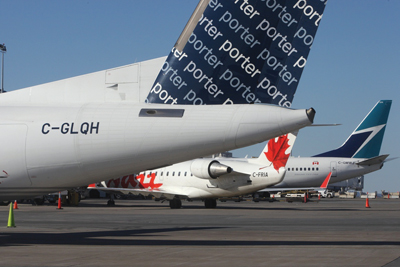
Features
Operations
At The Gate: Company’s coming
Porter has been gearing up for the arrival of company at Billy Bishop for some time and is using close to 140 of its 156 available slots.
September 27, 2010 By Brian Dunn
It’s been a smooth ride for Porter Airlines flying solo out of Billy Bishop Toronto City Airport on Toronto Island for the past four years, but those days are numbered. The regional carrier will soon have to share gates and slots with both Air Canada and Continental Airlines.
 |
|
Air Canada Jazz has been granted 30 slots and Continental 16 which will be operated by Continental regional affiliate Colgan Air between Newark, N.J. and Billy Bishop, a market currently served by Porter. Air Canada will use its slots to serve the heavily-travelled Toronto-Montreal-Ottawa triangle.
“We are looking forward to resume the service as soon as possible and have not announced specific timelines and service provider,” said Air Canada spokesperson Isabel Arthur. But it won’t be before the second phase of the airport terminal is complete which is scheduled for the end of December. Colgan Air did not return phone calls to determine when they plan to begin service from Billy Bishop.
Jazz Air has placed a firm order with Bombardier for 15 Q400 NextGen turboprop aircraft, the same plane flown by Porter, with options for an additional 15 aircraft. Aircraft deliveries are planned to begin next May and will accommodate 74 passengers in a single cabin. The first 15 Q400s will replace 15 50-seat regional jets and some of the aircraft are expected to be used for Air Canada’s new service out of Billy Bishop Airport.
What does this mean for Porter’s competitive advantage? It will still have 156 slots or 77 per cent of the 202 slots available. But does the arrival of competition harm its once unique selling proposition?
“No doubt it will hurt them from a financial aspect, because their monopoly was quite a valuable asset,” said Karl Moore of McGill University’s Faculty of Management. “But they saw it coming and have increased flights to other cities to lessen the blow. On the other hand, Porter still has the advantage of being a fun product, a nice atmosphere with comfortable leather seats and a very motivated staff. They also have the majority of slots which I don’t see changing anytime soon.”
Porter will still be in a position of strength with the vast majority of slots, agreed Calgary aviation consultant Rick Erickson, principal, RP Erickson & Associates.
“Although they will have competition with Jazz, they offer a high quality product and they’ve carved a nice niche in the Toronto-Montreal-Ottawa triangle. It will be interesting to see how (Air Canada’s) Aeroplan points will cut into their game.”
Both Porter and Jazz have impacted WestJet’s triangle business, so Erickson feels WestJet will be the big loser once Jazz begins service out of Billy Bishop Airport.
“I suspect those 30 slots will be used almost exclusively to service the triangle, so Jazz won’t have any impact on Porter’s U.S. business. Porter has also had real success flying to Thunder Bay and Moncton.”
Erickson also believes Porter, which, as a private company, doesn’t release financial results, is still in a strong financial position to withstand any competition that Jazz might throw at them.
“Nobody is taking Porter out and I don’t believe anyone will buy them out either.”
Porter has been gearing up for the arrival of company at Billy Bishop for some time and is using close to 140 of its 156 available slots, according to airline spokesperson Brad Cicero. With only 16 slots remaining, or eight return flights, he said Porter is looking at other growth opportunities within its existing network. For example, increasing Montreal-Halifax frequencies or maybe even Ottawa-Newark service that doesn’t involve a Toronto stopover. Porter will also make money from Air Canada and Continental who will have to pay rent for the use of gates and counter space to its subsidiary City Centre Terminal Corp.
Porter is also beefing up its fleet, confirming a new order for four Bombardier Q400 NextGen aircraft, plus six options. Based on the list price for the Q400 NextGen, Porter’s firm order is valued at approximately US$120 million, which could increase to US$308 million should all six options be converted to firm orders. Porter currently operates a fleet of 20 Q400 aircraft and the new order potentially raises this number to 30. The new aircraft are scheduled for delivery beginning in the second quarter of 2011, through the third quarter of 2012, including option aircraft.
Brian Dunn is a Wings writer and columnist.